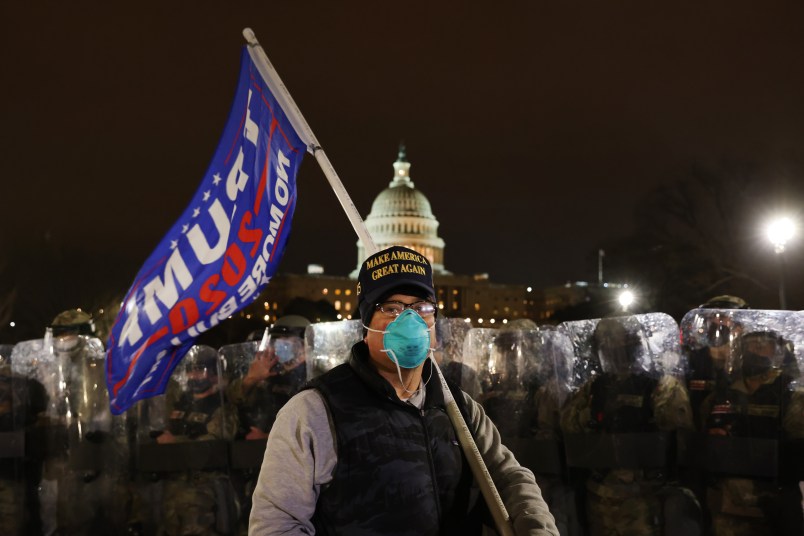The toplines of a tranche of new polls released since the Capitol insurrection show general themes: that Americans do not support the takeover of their government seat, and that President Donald Trump’s approval rating is steadily dropping.
But the crosstabs reveal a much darker picture. Majorities of Republican voters do not hold Trump or GOP lawmakers responsible for the violence their election fraud lies helped incite, and in some cases are even inclined to be sympathetic to the rioters themselves.
Trump’s GOP Allies
A full 70 percent of Republican voters in a Quinnipiac Poll released January 11 said that the Republican lawmakers who tried to stop the formal certification of President-Elect Joe Biden’s win were protecting democracy. Only 23 percent said they were undermining it.
Democrats in the same poll overwhelmingly saw the Republican lawmakers as undermining democracy by 90 percent, with only 9 percent saying they were protecting it.
The Republican numbers are similar in an ABC/Washington Post poll released Friday: of the 78 percent who approve of GOP lawmakers’ attempts to help Trump overturn the election, 51 percent said they didn’t go far enough. A mere 16 percent of Republicans said their attempts went too far.
And again, in an Economist/YouGov poll: 67 percent of Republicans either somewhat or strongly support the objections to the Electoral College certification.
The data helps explain the galling lack of introspection and self-reflection on the Republican side, when it comes to reckoning with their behavior that led to the mob. Their constituents, as captured in the polling, don’t believe they did anything wrong by crying election fraud despite a lack of proof.
Instead, most GOP lawmakers have been preaching “unity,” encouraging the incoming administration to turn the page on the insurrection and start the process of “healing.”
Trump Himself
Republican absolution held steady when the question was applied to Trump in the Quinnipiac poll: 73 percent of Republicans said Trump is protecting democracy to 20 percent who said he’s undermining it. Democrats, by 95 percent, said he’s undermining democracy to 4 percent saying he’s protecting it.
Meanwhile, in the same poll, a whopping 80 percent of Republicans do not hold Trump accountable for the Capitol siege.
That result is born out in the later ABC/Washington Post poll, where 78 percent of Republicans said that Trump bears no responsibility for the riot, or only some.
The Economist/YouGov poll shows a similar result: 72 percent of Republicans do not think Trump incited his supporters to violence, while 11 percent do. For the Democrats, 81 percent think Trump did incite the mob.
This attitude may explain the Republican resistance to punishing Trump thus far. On Wednesday, only 10 House Republicans joined the Democratic caucus to impeach Trump. Those 10 are already facing repercussions; there is a full-fledged intra-party campaign to boot Rep. Liz Cheney (R-WY), the highest-ranking Republican to vote for impeachment, from her leadership role.
The numbers may also be indicative of how the Senate trial portion of impeachment will shake out, if it ever happens. Reports of Republicans like Senate Majority Mitch McConnell (R-KY) seriously considering voting to convict Trump may be framing up the vote to be closer than it will be. Based on this data, Republicans will be voting in direct contradiction to how the vast majority of their constituents feel if they vote to remove Trump from office, or at least keep him from holding it again, depending on when the trial happens.
Trump’s Mob
In this area, the Quinnipiac poll shows Democratic and Republican voters to be on largely the same page when it comes to the rioters who stormed the Capitol: majorities of both, 70 percent of Republicans and 95 percent of Democrats, said the rioters were undermining democracy. Even bigger majorities of both groups want them held accountable.
But the Economist/YouGov poll suggests that many of these same voters share the rioters’ underlying objection to certifying the election. Seventy one percent of Republicans somewhat or strongly approve of the Trump supporters protesting the Electoral College certification — approval only slips when the Trump supporters breached the Capitol building itself.
In the same poll, Republicans also displayed sympathy to the rioters, with a plurality, or 42 percent, saying that they were “mostly peaceful” to 35 percent saying they were “mostly violent.” A large majority of Democrats, 84 percent, said the rioters were mostly violent.
Another poll, CBS News/YouGov, adds a shade of nuance to how Republicans feel about the Capitol invasion. While 73 percent of them say it was not an attempt to overthrow the government, 56 percent say it was an attempt to overturn the election and keep Trump in power. It’s a sign of how effective Trump’s conspiracy theory peddling has been that a majority of Republicans, at least in this poll, see overturning the November election result as preserving, not overthrowing, the government.
They’re also much more generous about the rioters’ aims than Democrats are, with 43 percent of Republicans describing the mob’s actions as “patriotism” and 50 percent saying the rioters were “defending freedom.”
Now, over a week after the insurrection, Democrats are demanding accountability and Republicans are starting to reckon with what a thoroughly Trumpified party is without Trump at its head.
These polls lay bare the massive problems with both holding Republicans to account for their behavior and purging Trump from the party. Trump’s poisonous election conspiracy theories, amplified by Republican lawmakers, have effectively seeped into the worldview of their constituents captured by this polling. Even if they don’t like the invading of the Capitol itself, the majority of Republicans appear to agree with the rioters’ underlying fury stemming from a conviction that the November election was stolen, and that Trump’s administration is coming to an unfairly early end.
When one party has so fully absorbed the fictionalized account that Biden is an illegitimate president, true “unity” seems a long way off.



